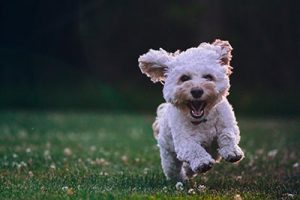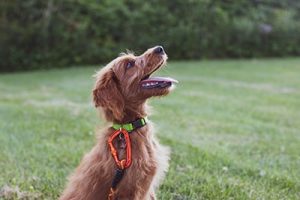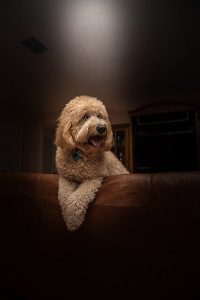This worrying time is likely to be pushing relationships with family and pets to breaking point, however, as a professional dog educator, I need to keep an eye on helping my clients and other dog owners in the local community. If you’re finding that your dog is not coping well with the current set of circumstances, here are a few tips to help you:
Routine

Yes, there are lots of things to worry about, but we don’t want to make matters worse by being locked in our homes with dogs that have too much energy and with nowhere to channel it. It could also be just calm dogs getting bored or dogs that become stressed by the change of routine. Add your dog to your contingency plan.
If you have a bit of a doggy athlete, start to wind it down. If your dog is a two-hour-walk sort, back off the minutes gradually over the next couple of weeks. A chase-the-ball and run-around-like-crazy routine has to change too.
These points are particularly relevant for dogs that have regular large-pack walks or go to high-energy doggy daycare centres. Have a serious think about this area of your dog’s life. Going from all-go to no-go would be difficult for children, let alone dogs.
If your dog has a very stringent routine, make gradual changes to it to avoid undue stress. On some days, move the regular 7.30am walk to 7am or 8am. Alter the length of the walk a little each time as well. Some dogs react very badly to sudden changes in their routine and if your dog gets stressed during this period, it might find it hard to return to its old habits.
Feeding
Think about how you feed your dog and how this should change if you’ve decreased exercise and activities due to the restrictions. If you’re using a high-energy brand, perhaps try a different formula that will suit a more placid regime. Get the dog used to smaller quantities, and different brands and flavours just in case the supply is interrupted. You have to be strong and persevere. It’s very easy to give into pets demanding more food or not eating what you’ve put in front of them.
Try these little tricks:
- Split your dog’s daily food ration into four helpings at the very least.
- You can place the food inside receptacles. Fill as many toys and pieces of feeding equipment as possible and make it harder for your dog to get the food out, but not so hard that your dog gives up. They will get better and more determined as the days go on.
- You may need a few extra treats or soft dog-food products to help you out as well, eg liver paste, soft cheese, etc.
- You can freeze food where possible to make it last longer.
- Put treats, small biscuits and kibble into bottles and boxes and give your dog a job to do! It might get a little messy, but again the dog will be happy!
- Scattering your dog’s food will give them more to do. You can hide it in small amounts around the garden and leave them to seek it out. Empty loo roll holders filled with food and the ends folded over make easy little parcels for hiding.
Continued…
The average Labrador can eat its dinner in about 15 seconds, but, as we mention above, there are lots of options for extending the time it takes and for making feeding time more stimulating. A ‘Kong Wobbler’ with the same amount of kibble in can take about 30 minutes (longer if you give it to them frozen) to empty and your dog can have fun pushing it around, particularly if he is not allowed to go on walks. Raw food is the easiest to squash inside things, but wetting kibble means you can use that too.
Pop to the pet shop or jump online and purchase a few canine-enrichment toys or equipment. Facebook has several canine enrichment groups owners can check out, plus there are lots of online articles.
Have you got enough food? Stockpiling is frowned upon (and quite rightly so), but having an extra month of food in for your dog won’t cause any issues. Be prepared. Here at Awesome and Rawsome Pets, we promise to deliver to anyone who can’t get to us. Check with your pet shop to ask what they can do for you if needs be.
Help

Who can you rely on? You might need to self-isolate if you develop Covid-19. Have an idea now about who you can call on to walk the dog or get your dog food if you are housebound. There is already well-documented health and safety information out there. The best idea might be for anyone who is going to to walk your dog to bring their own lead and collect the dog from a prearranged place; the garden being the most obvious location.
Dogs can’t get the illness, but, they can carry it so this advice will not be applicable if the dog owner has C-19.
Innovation!
By using bottles and boxes and other containers from around the house, you can create your own canine-enrichment toys. Be creative or, again, go online. There are lots of ideas on the internet for creating feeding toys and puzzles.
Play with your dog more or teach them to play in new ways with you. At BTPDS, we use the Craig Ogilvie interactive play method.

Consider creating a parkour course in your garden. Your dog can have fun climbing on all sorts of chairs, logs, benches and tables and under them too. Check out the website of the International Parkour Organisation for advice on how to do this fun sport safely with your dog.
You could create an agility course as well like a Hoopers one. Check out their website for videos and help.
Probably the best thing you can do to wear your dog out is teach them some scent-work! Generally speaking, 23 minutes of mental exercise is equivalent to an hour’s physical activity so get your dog’s favourite toy or favourite food and have them hunt for it.
Dogs love using their noses and if you can find a load of small boxes and place a small piece of cheese into one of them, your dog can have fun looking for it. You can leave them to look freely on their own or join in and make it a team game by showing them a systematic way to search for it. Top tip: remove the box or container you choose to hide the toy or food in before setting up again.
Become a dog trainer!
Use the time to give your dog some extra-curriculum activity! Over this period, BTPDS are running some live Facebook sessions and adding some vidoes to help owners practice with their dog. Every little helps to keep the dog, and even the owners, from going stir-crazy!

Of course, if any serious problems start to arise, seek help immediately from your vet or a behaviourist. Our concern at Beastly Thoughts Professional Dog Services is to ensure that in these troubling times, dogs don’t develop unwanted habits, their owners don’t feel so under pressure that they consider giving up their dog and that all family members stay safe.
If you have a new puppy or are just getting a puppy, BTPDS will also be producing an additional information article for this specific area. Having a well-balanced, happy puppy allows socialisation with people and other dogs which is critical.
To help owners get through the restrictions, BTPDS have created a Facebook group: The BTPDS Coronavirus Canine Enrichment Group. Email them to request to join.
Karen Boyce is the owner of Beastly Thoughts Professional Dog Services and Awesome and Rawsome Pets. They provide dog training, behaviour consultations and residential and rehabilitation boarding plus quality food and equipment.
They are members of the Pet Industry Federation (PIF) – the trade association for pet companies and pet professionals – and are a registered Animal Trainer with the Animal Behaviour and Training Council.
If you’d like to read more of our articles about looking after your dog, click here.


